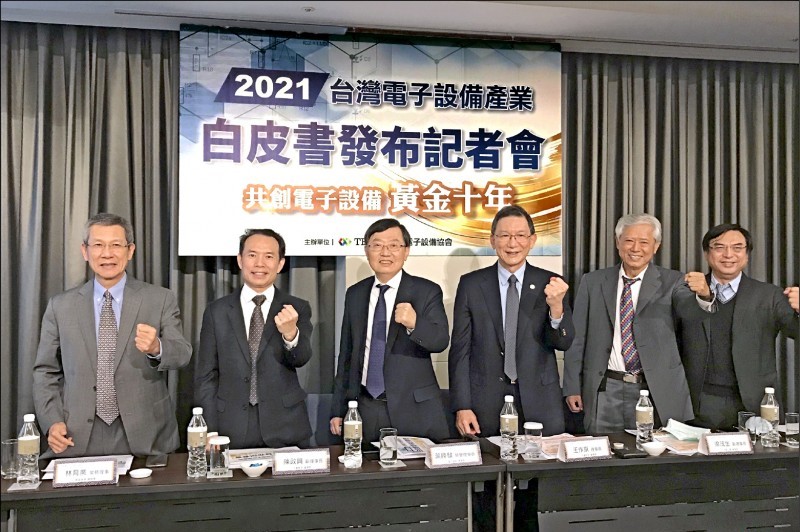
TEEIA Issues "Electronic Equipment White Papers, calling for enactment of legislation on development of semiconductor equipment industry
The TEEIA is committed to building a secure and localised industry. In response to the disproportionately high rate of equipment imports, the TEEIA developed the first "Electronic Equipment White Paper" that provides guidance from the development of key technologies, industrial policies and resources such as tax incentives and investment credits, the nurturing of talent, and international marketing and co-operation. The Association aims to create a self-sufficiency culture with the strategy of "high-quality localization of equipment" and to implement a semiconductor equipment certification programme from 2021. This year, the White Paper was issued to promote the strategy for the "Golden Decade of Electronic Devices" and puts forward 18 suggestions on government industrial policies, resource allocation and talent cultivation.
The domestic self-sufficiency rate of semiconductor front-end equipment is only 1%
The Electronic Equipment Association (TEEIA) pointed out that last year, Taiwan's semiconductor industry output reached NT$3.2 trillion, an important pillar of Taiwan's economy. However, 90% of the equipment is imported from the United States, Japan, the Netherlands, etc. In 2020, the self-sufficiency rate of semiconductor front-end equipment was only 1%, and the back-end equipment was about 15%, which means that there was a huge gap in key technology and competitiveness.
The vice chairman of the association said that the outbreak has drawn attention to the importance, reliability and necessity of Taiwan's semiconductor industry. The Government should hasten to complete the whole supply chain. He also pointed out that Taiwan purchases more than NT$700 billion of semiconductor equipment annually. Taiwan's own supply accounts for about 18 per cent and still has great potential for growth; however, electronic equipment industry in Taiwan primarily consists of many small and medium-sized enterprises (SME) with fewer large enterprises, making it difficult to compete with international manufacturers on their own.
The chairman, Mr. Wang, said, if the Government can nurture three to five unicorn companies in the equipment industry through appropriate industrial policies in the next five years, it will be conducive to the development and sustainability of the semiconductor industry in Taiwan.
Aiming to be the 3rd largest in the world in terms of output value by 2030.
In 2019, Taiwan Electronic Equipment Industry Association (TEEIA) published its first White Paper, which was received by President Tsai Ing-wen. This year, the TEEA again put forward 18 proposals for industrial development strategy, hoping that the output value will reach NT$1 trillion in ten years, making it the world's third-largest.
In the White Paper, there are two main demands: 1) hope that the government review the existing "Industry Classification System" and agree to the createe an "Electronic Equipment" sector. 2) To list semiconductor equipment as a national strategic industry, and to urge the relevant ministries and commissions to enact legislation on the Regulations for the Development of the Semiconductor Equipment Industry, so as to accelerate the development of the semiconductor equipment industry.
In addition, in order to ensure the safety of semiconductor equipment operators and factory environments, as well as to comply with international standards for semiconductor fabs, TEEIA worked with with the support of President Tsia to implement a semiconductor equipment certification programme in 2021.
In the future, TEEIA will continue to monitor the semiconductor equipment certification programme, review and update the content of the White Paper, expanding the quality and reputation of Taiwan's semiconductor equipment to the international arena, and achieving the goal of common good.
